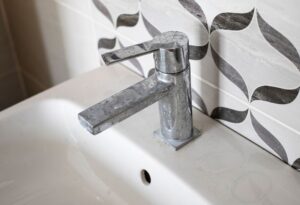
Understanding Hard Water
What Is Hard Water?
Hard water contains high levels of minerals, primarily calcium and magnesium. These minerals are naturally present in many water sources and are harmless when consumed. However, they can wreak havoc on your plumbing and appliances over time.
The Impact on Your Plumbing
Scale Buildup: The minerals in hard water can accumulate inside your pipes and appliances, forming scale deposits. These deposits restrict water flow, reducing water pressure and making it harder for your plumbing system to operate efficiently.
Reduced Appliance Lifespan: Appliances like water heaters, dishwashers, and washing machines can suffer from reduced efficiency and a shortened lifespan due to scale buildup from hard water.
Soap Scum and Limescale: Hard water can form soap scum in showers and sinks and limescale on faucets and fixtures, making cleaning more challenging.
Identifying Hard Water
Signs of Hard Water:
Soap Doesn’t Lather Well: Hard water interferes with soap lathering, leaving a soapy residue on your skin and dishes.
White Deposits on Fixtures: If you notice white, chalky deposits on faucets, showerheads, or glassware, it’s a sign of hard water.
Reduced Appliance Efficiency: Appliances like water heaters may become less efficient over time, increasing energy costs.
Prevention and Solutions
- Water Softeners: Installing a water softener is one of the most effective ways to combat hard water. These devices use ion exchange to remove calcium and magnesium ions from water, preventing scale buildup.
- Scale Inhibitors: Scale inhibitors are another option. They work by altering the chemical structure of minerals in the water, preventing them from forming scale deposits.
- Regular Maintenance: To minimize the effects of hard water, schedule regular maintenance for your plumbing and appliances. Flushing your water heater, for example, can help prevent scale buildup.
- Water Quality Testing: Consider having your water tested to determine its hardness level. This can help you choose the most appropriate solution for your specific situation.
Protecting Your Plumbing from Hard Water
Hard water may be a common issue, but it doesn’t have to take a toll on your plumbing system and daily life. By understanding the impact of hard water, identifying its signs, and exploring preventive measures and solutions like water softeners and scale inhibitors, you can protect your plumbing and enjoy the benefits of cleaner water and more efficient appliances. Keep hard water from building up; take action to preserve the health and longevity of your plumbing system. Call (951) 475-6521 to schedule an appointment with an expert plumber from Top Tier Plumbing and Rooter for all your plumbing needs.

